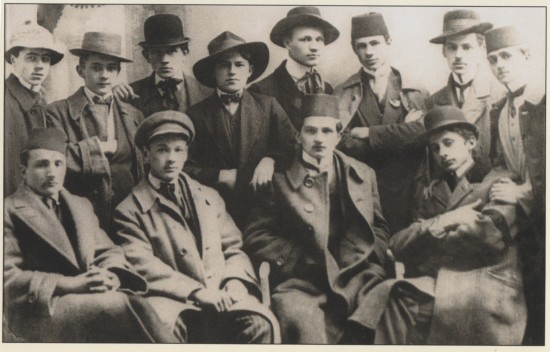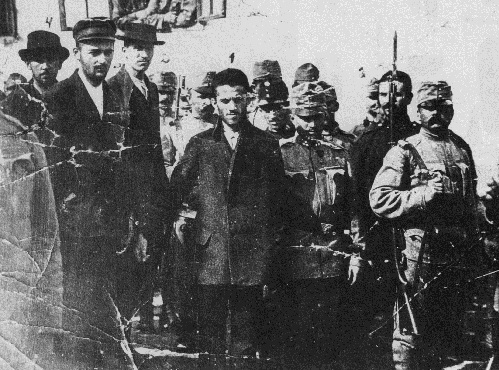 Franz Ferdinand’s (somewhat casual) assassin, Gavrilo Princip, was loathed as the most wicked of murderers and hailed as a liberation hero. One hundred years on, the role of the group that orchestrated the plot, Young Bosnia, is still debated. The Bosnian writer Muharem Bazdulj sketches a portrait of the underground movement that triggered the start of the Great War – and the unification of the South Slavs.
Franz Ferdinand’s (somewhat casual) assassin, Gavrilo Princip, was loathed as the most wicked of murderers and hailed as a liberation hero. One hundred years on, the role of the group that orchestrated the plot, Young Bosnia, is still debated. The Bosnian writer Muharem Bazdulj sketches a portrait of the underground movement that triggered the start of the Great War – and the unification of the South Slavs.
The centenary of the Sarajevo Assassination, the event which triggered World War One, sparked a renewed interest for the “Young Bosnia” movement, the unofficial group gathering illegal associations of Bosnian students at the beginning of the past century. Members of the movement were Gavrilo Princip and his friends and fellow conspirators, as well as Ivo Andrić, later awarded with a Nobel Prize for literature.


BBC Breaking News style coverage of Archduke Franz Ferdinand’s assasination is available here.
The whole phenomenon of “Young Bosnia” cannot be understood properly without a wider context. In 1878, after more than four centuries of Ottoman rule, Bosnia was occupied by Austria-Hungary. This was done with the Great Powers’ blessing, obtained at the Congress of Berlin earlier that year. Although Austrians did not expect any resistance from the local population, Bosnian forces, mainly Muslim, strenuously fought back. Resistance was broken after few months, and the leader of the uprising, Hadji Loyo, was imprisoned in the Theresienstadt fortress – located in today’s Czech Republic.
In the years to come, Austria-Hungary was to put quite some effort into its newly-conquered territory: they built roads and railways and opened high schools, intending to facilitate colonial exploitation of the new domain. The outcome proved ironic. Although local high schools were meant to produce clerks loyal to the Empire, in fact they became a cradle for the young rebels.
The last decades of the 19th and the first decades of the 20th century were the time when progressive individuals of South Slavic origin dreamt about the unification of the South Slavs and the creation of their great and powerful homeland: Yugoslavia. Encouraged by the recent unification of Germany and Italy, they saw the opportunity for a similar chain of events happening in the South Slavic world, seeing independent Serbia as their own Piedmont. The students who were members of “Young Bosnia” shared this dream.
The story of Gavrilo Princip is a paradigmatic one. He was born in the village of Obljaj in western Bosnia in 1893. He left his village for the first time as a twelve-year-old boy, to move to Sarajevo and study there. On his first night in Sarajevo, he urged his older brother not to sleep in a local inn where he saw some local Muslims, because “he did not want to sleep under the same roof with the Turks”. Only few years later, however, Princip would insist on the feeling of brotherhood among all South Slavs – Serbs, Croats and Muslims alike. Some of his best friends were Croats and Muslims. In 1912, the young Gavrilo was expelled from Sarajevo high school after taking part in student demonstrations in solidarity with a Muslim student, Salih Sahinagić, who was injured by the Austrian police during a previous strike. After being expelled, Princip moved to Belgrade. During the Sarajevo years, he developed a specific literary taste: he read British authors like William Morris, Oscar Wilde and Arthur Conan Doyle, German philosophers such as Arthur Schopenhauer and Friedrich Nietzsche, as well as poetry by Walt Whitman.
In Belgrade, Princip enrolled in high school. He was, of course, not the only Bosnian there. He lived on a meager stipend given to him by his older brother and spent time hanging out in the cafés in the Zeleni Venac neighborhood along with his friends – which included Trifko Grabež, a fellow high school student, and Nedeljko Čabrinović, who worked as a typographer. In 1912 and 1913, Serbia won two Balkan wars and the young Bosnians saw it as a signal of the forthcoming liberation of all South Slavs. Princip even volunteered to fight as a soldier in the Balkan wars, but was rejected because he had tuberculosis and was generally too weak.
When news broke that the heir apparent to the Habsburg throne, Archduke Franz Ferdinand, would visit Sarajevo on 28th of June 1914, Princip, Grabež and Čabrinović agreed to kill him. They needed weapons, and acquired guns and bombs through connections with soldiers in the Serbian army. It is important to emphasize one fact: the assassination plan was cooked up by Bosnian youths; individuals from Serbia just helped them with the logistics. The weapons were Serbian, the idea – Bosnian.
Princip managed to kill the Archduke on the 28th of June; exactly a month later the Great War started. Princip, Grabež and Čabrinović all died in prison during the war. Coincidentally, Princip perished in the same prison cell in Theresienstadt where Hadji Loyo was imprisoned almost forty years earlier. Princip said that he was glad that the first and last Bosnian convicts of the Austro-Hungarian Empire were jailed in the very same cell.

Yugoslavia, the country that was the dream of all Young Bosnians, was created in 1918 and then resurrected in 1945. In the same year of 1945, Ivo Andrić, Princip’s older mate from Sarajevo high school, published his masterpiece The Bridge on the Drina. Through his literary activity Andrić redeemed, in a way, his friends from “Young Bosnia”. The last chapters of the novel are set in 1913 and 1914. In the novel, a young man from Višegrad in eastern Bosnia talks to the girl he loves in the spring of 1914:
“We must get away from here, as from a house that is falling down. These countless and uneasy saviours who pop up at every step are the best proof that we are heading for a catastrophe. Since we cannot help, we can at least save ourselves.You know that Bogdan Djurović, my friend from Okolište, has now been in America for three years. I have been in correspondence with him since last year. I showed you the photograph he sent me. He has asked me to come over there and has promised me a safe job at a good wage. I know that it is not a simple matter to do all this, but I do not think it is impossible. I have thought everything over and calculated everything. I will sell the little property I have up there at Okolište. If you will say yes, we will get married as soon as possible and leave for Zagreb without saying anything to anyone. There is a company there which arranges for emigrants to get to America. (…) In America we will both work.There are Serbian schools there where you could teach. I would easily find work there, for over there all jobs are open and unrestricted. We will be free and happy. I will arrange everything, if only you would … if only you would agree.”
The girl had some second thoughts and then the news about the assassination came from Sarajevo. The two of them later met on the street. He informed her that he was planning to go to Serbia and join the Serbian army. She said: “Then there is nothing of our… nothing of America?” He answered: “If I come out of all this alive and if we become free, then it may no longer be necessary to go across the sea to America, for we shall have our own America here, a land in which a man may work hard and honestly and live well and freely.”
That was the key idea of “Young Bosnia”: Yugoslavia as a land in which a man may work hard and honestly and live well and freely. Our own America, so to speak.
Note: This article gives the views of the author, and not the position of LSEE Research on SEE, nor of the London School of Economics.
____________________________
Muharem Bazdulj is a writer, translator and journalist with the Serbian newspaper “Vreme”. In June 2014 he was awarded with the “Stanislav Staša Marinković” prize for investigative journalism and professional courage.



“The whole phenomenon of “Young Bosnia” cannot be understood properly without a wider context.”
You lost me there, good sir.